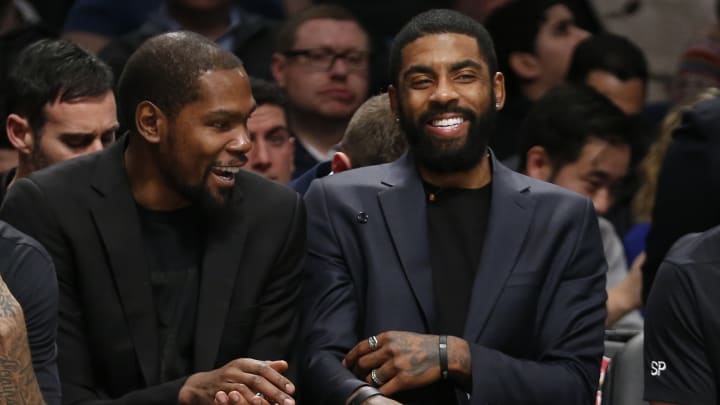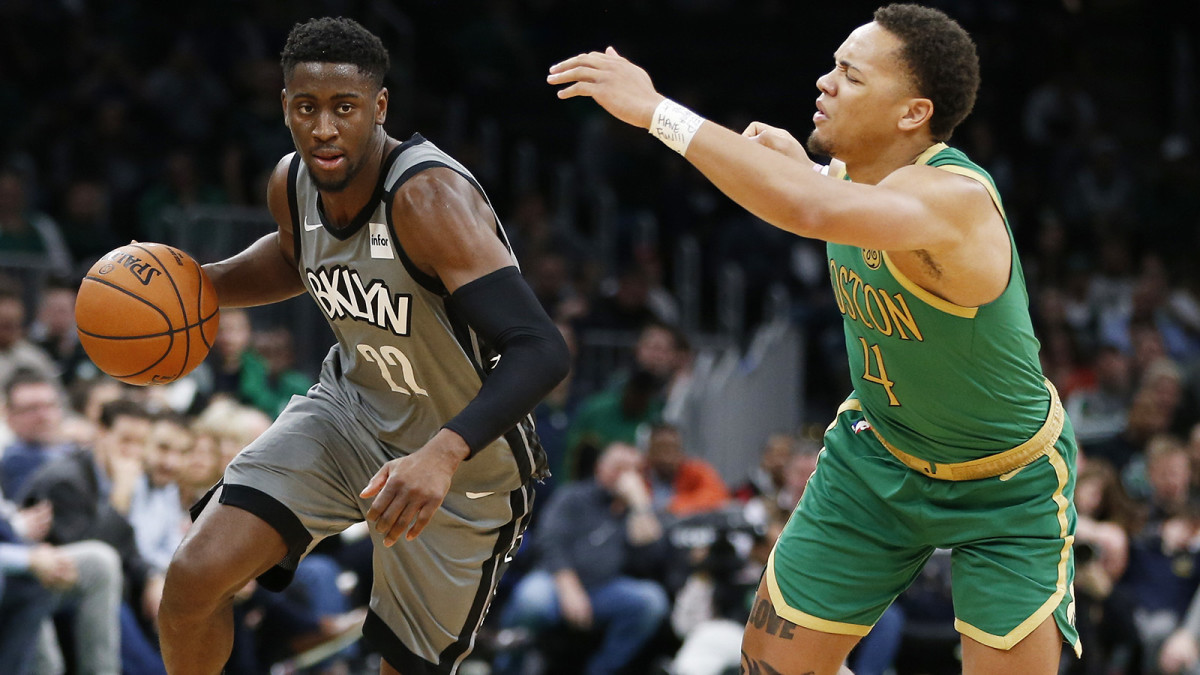The Nets Continue to Fight Gap Year Perception

BOSTON – So the Nets season is almost over.
And what a weird one it’s been.
With just over a month left in the regular season, Brooklyn could, probably will, make the playoffs. The Nets won a stunner over the Jayson Tatum-less Celtics on Tuesday, improving to 27-33, and with the East’s last two playoff spots almost certainly being occupied by sub-.500 teams (yuck) Brooklyn is in position to play postseason games for the second straight year, an experience the Nets collection of young players will most certainly benefit from.
The Nets might miss the playoffs, and that may not be a bad thing, either. Kyrie Irving had shoulder surgery on Tuesday, officially ending his season. Brooklyn’s pick this June is earmarked for Atlanta if the Nets make the postseason, and with a nine-figure payroll there’s enormous value in cheap talent. Management has told Kenny Atkinson to push for a playoff spot, Atkinson said on Tuesday, but there are probably more than few folks on Flatbush Avenue that will be happy if they don’t.
But really—does this season matter?
For months, the Nets have been fighting this perception. That this was a gap year. A bridge year. A year to have some fun, make the playoffs and be ready to take the league by storm in 2020, when Kevin Durant’s Achilles is healed and Brooklyn will have a dynamic one-two punch.
Wins didn’t matter as much as not looking like the basketball Clampetts.
The team rejected that suggestion, loudly. Besides, Irving was there, and there was something to be gained from Irving developing a rhythm with Brooklyn’s returning players, wasn’t there? Irving famously failed to develop anything close to good chemistry with Boston’s young stars last season. Surely there would be a benefit to Irving sharing a perimeter with Spencer Dinwiddie, Caris LeVert and Joe Harris.
Right?
Well …
The Nets closed the book on Irving after 20 games this season. The trio of Irving, Dinwiddie and LeVert shared the floor in just 15 of them, per NBA.com, with 67 minutes spent playing together. That’s the equivalent of about 5 ½ quarters, or roughly enough time to determine which hand a player likes to drive with. There were some good moments—the 48 points Irving and Dinwiddie combined for in a January win over Detroit, for example—but not enough to draw any conclusions.
And that’s important, because more than anything the Nets need to enter this offseason knowing what works. Durant’s return shakes up the frontcourt, but this season figured to reveal whether Irving and Dinwiddie could co-exist, or if Dinwiddie was Terry Rozier 2.0. If there were enough touches to go around for three ball dominant players. If the three of them wanted to play together, or if a trade was needed.
On Tuesday, I asked Atkinson just how confident he was the Irving/Dinwiddie/LeVert trio could work.
“That’s a very good question,” Atkinson said. “That would be the piece we still have to figure out. You have a lot of ball dominant guards. That being said, Caris and Spencer, with D’Angelo [Russell], they played a lot without the ball. I think D’Angelo’s usage rate was higher than Kyrie’s. We can definitely do it. At the end of the day … you find a way if you have really good players. That would be up to the coaching staff to figure out how the pieces work. But I can understand what you’re saying. Structurally, you might have some similarities there.”

Indeed. Tuesday offered an example. With Irving sidelined, LeVert went bonkers. He scored 51 points, 37 of which came in the fourth quarter and overtime. He coolly sank three free throws to send the game to overtime. Marcus Smart, one of the NBA’s best defenders, couldn’t slow him down.
Said Celtics coach Brad Stevens, “LeVert is special.”
But can he be special alongside Irving? It’s not an indictment of Irving, one of the NBA’s preeminent scorers, when healthy. It’s just not everyone is built to play alongside him. The Nets had hoped to get a long look at the backcourt rotation. They didn’t, and now will have use the information they do have to make key decisions this summer.
“Every year is a strange year in the NBA,” said Atkinson. “That’s what I’m learning—it’s never what you think it’s going to be. But I think it helps you grow … we’ve learned a lot about the team, we’ve learned a lot about our players, we learned a lot through these struggles, the fight, the desperate fight we are going through right now to get in the dance. So I look at it positively. We’re learning a lot this season.”
The offseason will be interesting, with the pressure pivoting to GM Sean Marks and key decisions he will need to make. For now, the Nets are in a familiar position: Young team, clawing out wins, hoping to earn one of the East’s final playoff spots.
“I love it,” Atkinson said. “Embrace the struggle. I know that sounds corny, but we have to wrap our arms around this. That’s when you learn a lot about your group. Anybody that says we are waiting for next year, no, we’re building for next year. This will help us down the line. I’ve told KD and Kyrie that. We’d love to have you fly in on your capes, but this will be good for us to go through what we’re going through right now. I really believe that.”
